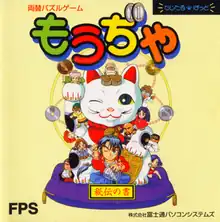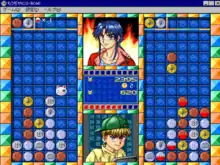| Moujiya | |
|---|---|
 | |
| Developer(s) | |
| Publisher(s) | FPS (Windows 3.1, Windows 95, Mac)
|
| Director(s) | Ozzy |
| Producer(s) | Izumi Sugawara Sunao Ueda |
| Programmer(s) | Ozzy Joe Mizuno |
| Artist(s) | Komugi Jeronimo Isaka Yasumi Agatsuma |
| Composer(s) | Satoru Wono |
| Platform(s) |
|
| Release | |
| Genre(s) | Puzzle |
Moujiya or Ryougae Puzzle Mouja[lower-alpha 1] is a falling blocks puzzle video game from Fujitsu Pasocom Systems, the consumer software division of Fujitsu.[1] Initially developed for computers running Windows 3.11 and above, it later got made into an arcade video game,[2] which itself was ported to popular home consoles of the time.[6][4]
Gameplay

Moujiya’s gameplay is somewhat similar to Puyo Puyo, in that it is a falling blocks game in which the units fall in pairs and must be grouped together with other units of the same type. Here, the units consist of yen coins, which are exchanged for one of the next denomination when enough coins are grouped side by side. When two ¥500 coins are grouped together, they are exchanged for a ¥1,000 banknote and are removed from the board.[1] This coin-exchanging mechanic was later copied by Face and combined with Magical Drop’s gameplay to make Money Idol Exchanger, which saw much wider success, being released across the world, possibly due to the popularity of SNK's Neo Geo arcade platform at the time.[7]
Releases and spin-offs
The game was originally released in 1995 for Windows 3.1. A second version was released in 1997 for Windows 95 and which allowed for online play. This version was also released on Macintosh.
In 1996, Etona licensed Moujiya from Fujitsu and commissioned Racjin to make an arcade conversion.[2] This game, made from the ground up, featured a completely new cast of characters and different garbage block mechanics from the original, among other lesser changes.[8] Etona's version was then ported to the Sega Saturn and also to the PlayStation shortly thereafter, with the publishing being handled by Virgin Interactive Entertainment.[6] In 1999, Hect would snatch up publishing rights for the PlayStation version and rerelease it under their Honkakuha de ¥1,300 Series budget label.[5]
In the 2000s, mobile game company BTD Studio would license Mouja for release on Japanese cellular services. Its first game was Chou Ge Moujiya, a cut down version of the arcade game released only on i-mode.[3] They would later make two spin-offs: Doubutsu de Moujiya, also only on i-mode, and Gals★Moujiya, part of their Gals Kiss series of burlesque games, released on i-mode, EZweb and S!Appli.
Notes
- ↑ Moujiya got released under a variety of slightly different spellings across its many ports and versions, sometimes used inconsistently within the same release, which become even more numerous when accounting for differing transliteration standards. Some of the names used are Mouja, Moudja, Moujiya, Moudjiya, Ryougae Puzzle Game Moujiya, Ryougae Puzzle Mouja and so forth (all variations of 両替パズルゲーム/両替パズル もうぢや/もうぢゃ).
References
- 1 2 3 4 5 両替パズルゲーム もうぢや (PDF), Kawasaki City: 株式会社富士通パソコンシステムズ, 1995, retrieved April 8, 2023
- 1 2 3 4 赤木真澄 (2005), アーケードTVゲームリスト国内•海外編(1971-2005), Nishinomiya: アミューズメント通信社, p. 63, retrieved April 8, 2023
- 1 2 "超ゲーもうぢや". BTD STUDIO iアプリ. BTD STUDIO. Retrieved April 2, 2023.
- 1 2 3 "MOUJA - (NTSC-J)". PlayStation DataCenter. Retrieved April 8, 2023.
- 1 2 3 "MOUJA [1300YEN REPRINT] - (NTSC-J)". PlayStation DataCenter. Retrieved April 8, 2023.
- 1 2 3 "[セガハード大百科] セガサターン対応ソフトウェア(ライセンシー発売". SEGA. SEGA CORPORATION. 1997. Retrieved April 8, 2023.
- ↑ Jonny (2015). "Mouja (Arcade)". Lunatic Obscurity. Blogger. Retrieved April 8, 2023.
- ↑ もうぢゃ [Mouja] (Software) (in Japanese). Etona. April 1996.